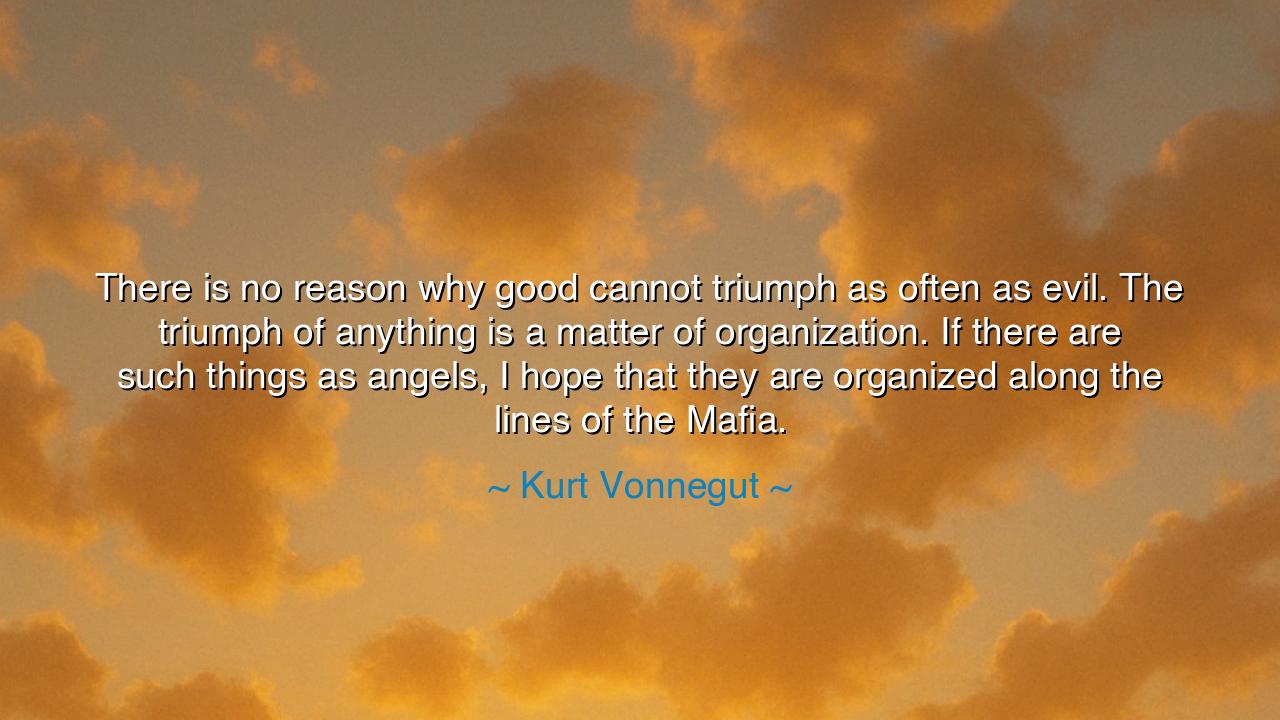
There is no reason why good cannot triumph as often as evil. The
There is no reason why good cannot triumph as often as evil. The triumph of anything is a matter of organization. If there are such things as angels, I hope that they are organized along the lines of the Mafia.






“There is no reason why good cannot triumph as often as evil. The triumph of anything is a matter of organization. If there are such things as angels, I hope that they are organized along the lines of the Mafia.” Thus spoke Kurt Vonnegut, the satirist, the philosopher disguised as a storyteller, who wielded irony not as a weapon of mockery but as a mirror for truth. In these words, he offers a paradox both humorous and profound — a declaration that beneath all moral battles lies the same essential truth: goodness must be organized if it wishes to prevail. For though good may dwell in the heart, it is structure, discipline, and unity that give it strength in the world.
Vonnegut, who lived through the chaos of war and the illusions of modern progress, understood the frailty of goodness left to drift. He had seen evil well-organized — armies, empires, corporations, ideologies — each built upon hierarchies, strategies, and clear purpose. But good, too often, he found scattered and uncoordinated, relying upon faith, chance, or sentiment. His words are a challenge to humanity: to build systems for virtue as carefully as we build systems for profit or power. For moral intention, however noble, cannot triumph without form. Goodness must learn the discipline of structure, lest it forever remain a dream crushed beneath the machinery of greed.
To call upon angels to organize “along the lines of the Mafia” is Vonnegut’s way of turning sacred imagery upside down to reveal a deeper truth. The Mafia, though devoted to dark purposes, is an example of loyalty, hierarchy, and relentless coordination. Its success lies not in its motives, but in its unity. Vonnegut’s irony teaches that if evil can thrive through cooperation, then good, properly united and strategic, could be unstoppable. He does not praise corruption; he laments that those who serve righteousness often fail to match the efficiency and solidarity of those who serve their own gain. His plea is not for angels to become ruthless, but for them to become effective.
This lesson resounds throughout history. Consider the abolition of slavery — a moral good that triumphed not merely through passion, but through organization. It was the tireless work of networks: the Underground Railroad, the reformers, the writers, the preachers, and the politicians, bound together by a shared purpose. Harriet Tubman, Frederick Douglass, and William Wilberforce each fought not alone, but as part of a vast web of coordinated courage. They understood that moral outrage without structure fades like smoke, but righteous cooperation moves mountains. Their triumph was not accidental; it was the victory of organized goodness.
The same truth appeared in the civil rights movement of the twentieth century. Dr. Martin Luther King Jr. did not rise as a lone prophet — he led a disciplined, interconnected movement. The marches, the boycotts, the speeches — all meticulously planned, bound by moral vision and strategic structure. Against them stood centuries of organized injustice: laws, governments, prejudice made institutional. Yet through unity and order, good triumphed, and the conscience of a nation began to awaken. Vonnegut’s words echo here, as prophecy fulfilled — the angels had, for a moment, learned the language of organization.
Vonnegut’s wisdom also carries a warning. Evil triumphs not because it is stronger, but because it is coordinated. Good fails not because it is weaker, but because it is scattered. The forces of cruelty, greed, and indifference build institutions, networks, and rituals to protect their interests; those of kindness and truth must do the same. The compassionate must form alliances. The dreamers must become planners. The idealists must learn the art of structure. For goodness without discipline is like light without focus — it shines beautifully but burns nothing.
So, my child, take this teaching to heart: virtue alone is not enough. To make goodness real in the world, it must be bound with will, order, and cooperation. If you would do good, do it not as a wanderer, but as a builder. Gather others who share your purpose. Plan your actions as carefully as your adversaries plan theirs. Forge networks of kindness, armies of empathy, councils of justice. Let your compassion be fierce and your organization firm. For goodness deserves not only the heart of a saint but the strategy of a general.
And thus, remember Vonnegut’s wisdom — half jest, half revelation: angels must learn to work like the Mafia. Let your goodness be loyal, your kindness relentless, your justice united. Do not leave righteousness to fortune; give it form, give it order, give it strength. For when good learns to organize as well as evil, the world will no longer fear the triumph of darkness — it will witness the dawn of a disciplined light, radiant and unstoppable.






AAdministratorAdministrator
Welcome, honored guests. Please leave a comment, we will respond soon